 I see that this piece on nature.com has drawn quite a bit of attention. It provides a round-up of views on the question of whether free will can survive in a post-Libet world, though it highlights more recent findings along similar lines by John-Dylan Haynes and others. The piece seems to be prompted in part by Big Questions in Free Will a project funded by the John Templeton Foundation, which is probably best known for the Templeton Prize, a very large amount of cash which gets given to respectable scientists who are willing to say that the universe has a spiritual dimension, or at any rate that materialism is not enough. BQFW itself is offering funding for theology as well as science: “science of free will ($2.8 million); theoretical underpinnings of free will, round 1 ($165,000); and theology of free will, round 1 ($132,000)”. I suppose ‘theoretical underpinnings’, if it’s not science and not theology, must be philosophy; perhaps they called it that because they want some philosophy done but would prefer it not to be done by a philosopher. In certain lights that would be understandable. The presence of theology in the research programme may not be to everyone’s taste, although what strikes me most is that it seems to have got the raw end of the deal in funding terms. I suppose the scientists need lots of expensive kit, but on this showing it seems the theologians don’t even get such comfortable armchairs as the theorists, which is rough luck.
I see that this piece on nature.com has drawn quite a bit of attention. It provides a round-up of views on the question of whether free will can survive in a post-Libet world, though it highlights more recent findings along similar lines by John-Dylan Haynes and others. The piece seems to be prompted in part by Big Questions in Free Will a project funded by the John Templeton Foundation, which is probably best known for the Templeton Prize, a very large amount of cash which gets given to respectable scientists who are willing to say that the universe has a spiritual dimension, or at any rate that materialism is not enough. BQFW itself is offering funding for theology as well as science: “science of free will ($2.8 million); theoretical underpinnings of free will, round 1 ($165,000); and theology of free will, round 1 ($132,000)”. I suppose ‘theoretical underpinnings’, if it’s not science and not theology, must be philosophy; perhaps they called it that because they want some philosophy done but would prefer it not to be done by a philosopher. In certain lights that would be understandable. The presence of theology in the research programme may not be to everyone’s taste, although what strikes me most is that it seems to have got the raw end of the deal in funding terms. I suppose the scientists need lots of expensive kit, but on this showing it seems the theologians don’t even get such comfortable armchairs as the theorists, which is rough luck.
We have of course discussed the Haynes results and Libet, and other related pieces of research many times in the past. I couldn’t help wondering whether, having all this background, I could come up with something on the subject that might appeal to the Templeton Foundation and perhaps secure me a modest emolument? Unfortunately most of the lines one could take are pretty well-trodden already, so it’s difficult to come up with an appealing new presentation, let alone a new argument. I’m not sure I have anything new to say. So I’ve invited a couple of colleagues to see what they can do.

 Free will is nonsense; I’m not helping you come up with further ‘compatibilist’ fudging if that’s what you’re after. What I can offer you is this: it’s not just that Libertarians have the wrong answer, the question doesn’t even make sense. The way the naturenews piece sets up the discussion is to ask: how can you have free will if the decision was made before you were even aware of it? The question I’m asking is: what the hell is ‘you’?
Free will is nonsense; I’m not helping you come up with further ‘compatibilist’ fudging if that’s what you’re after. What I can offer you is this: it’s not just that Libertarians have the wrong answer, the question doesn’t even make sense. The way the naturenews piece sets up the discussion is to ask: how can you have free will if the decision was made before you were even aware of it? The question I’m asking is: what the hell is ‘you’?
Both Libet’s original and the later experiments are cleverly designed to allow subjects to report the moment at which they became aware of the decision: but ‘they’ are thereby implicitly defined as whatever it is that is doing the reporting. We assume without question that the reporting thing is the person, and then we’re alarmed by the fact that some other entity made the decision first. But we could equally well take the view that the silent deciding entity is the person and be unsurprised that a different entity reports it later.
You will say in your typically hand-waving style, I expect, that that can’t be right because introspection or your ineffable sense of self or something tells you otherwise. You just feel like you are the thing that does the reporting. Otherwise when words come out of your mouth it wouldn’t be you talking, and gosh, that can’t be right, can it?
Well, let me ask you this. Suppose you were the decision-making entity, how would it seem to you? I submit it wouldn’t seem any way, because as that entity you don’t do seeming-to: you just do decisions. You only seem to yourself to have made the decision when it gets seemed back to you by a seeming entity – in fact, by that same reporting entity. In short, because all reports of your mental activity come via the reporting entity, you mistake it for the source of all your mental activity. In fact all sorts of mental processes are going on all over and the impression of a unified consistent centre is a delusion. At this level, there is no fixed ‘you’ to have or lack free will. Libet’s experiments merely tell us something interesting but quite unworrying about the relationship of two current mental modules.
So libertarians ask: do we have free will? I reply that they have to show me the ‘we’ that they’re talking about before they even get to ask that question – and they can’t.

 Not much of a challenge to come up with something more appealing than that! I’ve got an idea the Templeton people might like, I think: Dennettian theology.
Not much of a challenge to come up with something more appealing than that! I’ve got an idea the Templeton people might like, I think: Dennettian theology.
You know, of course, Dennett’s idea of stances. When we’re looking to understand something we can take various views. If we take the physical stance, we just look at the thing’s physical properties and characteristics. Sometimes it pays to move on to the design stance: then we ask ourselves, what is this for, how does it work? This stance is productive when considering artefacts and living things, in the main. Then in some cases it’s useful to move on to the intentional stance, where we treat the thing under consideration as if it had plans and intentions and work out its likely behaviour on that basis. Obviously people and some animals are suitable for this, but we also tend to apply the same approach to various machines and natural phenomena, and that’s OK so long as we keep a grip.
But those three stances are clearly an incomplete set. We could also take up the Stance of Destiny: when we do that we look at things and ask ourselves: was this always going to happen? Is this inevitable in some cosmic sense? Was that always meant to be like that? I think you’ll agree that this stance sometimes has a certain predictive power: I knew that was going to happen, you say: it was, as it were, SoD’s Law.
Now this principle gives us by extrapolation an undeniable God – the God who is the intending, the destining entity. Does this God really exist? Well, we can take our cue from Dennett: like the core of our personhood in his eyes, it doesn’t exist as a simple physical thing you can lay your hands on: but it’s a useful predictive tool and you’d be a fool to overlook it, so in a sense it’s real enough: it’s a kind of explanatory centre of gravity, a way of summarising the impact of millions of separate events.
So what about free will? Well of course, one thing you can say about a free decision is that it wasn’t destined. How does that come about? I suggest that the RPs Libet measured are a sign of de-destination, they are, as it were, the autopilot being switched off for a moment. Libet himself demonstrated that the impending action could be vetoed after the RP, after all. Most of the time we run on destined automatic, but we have a choice. The human brain, in short, has a unique mechanism which, by means we don’t fully understand, can take charge of destiny.

I think my destiny is to hang on to the day job for the time being.

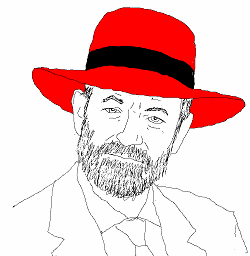 ‘Aping Mankind’ is a large scale attack by Raymond Tallis on two reductive dogmas which he characterises as ‘Neuromania’ and ‘Darwinitis’. He wishes especially to refute the identification of mind and brain, and as an expert on the neurology of old age, his view of the scientific evidence carries a good deal of weight. He also appears to be a big fan of Parmenides, which suggests a good acquaintance with the philosophical background. It’s a vigorous, useful, and readable contribution to the debate.
‘Aping Mankind’ is a large scale attack by Raymond Tallis on two reductive dogmas which he characterises as ‘Neuromania’ and ‘Darwinitis’. He wishes especially to refute the identification of mind and brain, and as an expert on the neurology of old age, his view of the scientific evidence carries a good deal of weight. He also appears to be a big fan of Parmenides, which suggests a good acquaintance with the philosophical background. It’s a vigorous, useful, and readable contribution to the debate.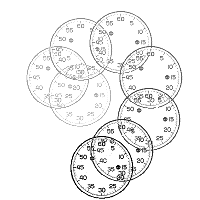 Libet’s
Libet’s 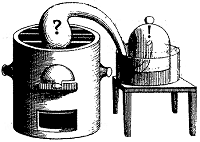 Shaun Nichols’ recent paper in
Shaun Nichols’ recent paper in 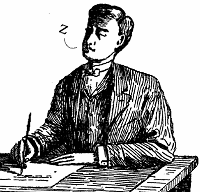 Here’s an interesting
Here’s an interesting 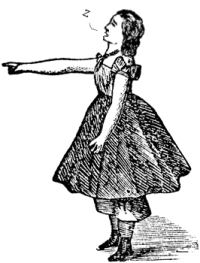 Does the idea of unconscious free will even make sense? Paula Droege, in the recent JCS, seems to think it might. Generally experiments like
Does the idea of unconscious free will even make sense? Paula Droege, in the recent JCS, seems to think it might. Generally experiments like 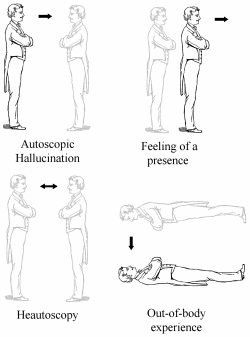 Among a number of interesting features, The Ego Tunnel includes a substantial account of out-of-body experiences (OBEs) and similar phenomena. Experiments where the subjects are tricked into mistaking a plastic dummy for their real hand (all done with mirrors), or into feeling themselves to be situated somewhere behind their own head (you need a camera for this) show that our perception of our own body and our own location are generated within our brain and are susceptible to error and distortion; and according to Metzinger this shows that they are really no more than illusions (Is that right, by the way – or are they only illusions when they’re wrong or misleading? The fact that a camera can be made to generate false or misleading pictures doesn’t mean that all photographs are delusions, does it?).
Among a number of interesting features, The Ego Tunnel includes a substantial account of out-of-body experiences (OBEs) and similar phenomena. Experiments where the subjects are tricked into mistaking a plastic dummy for their real hand (all done with mirrors), or into feeling themselves to be situated somewhere behind their own head (you need a camera for this) show that our perception of our own body and our own location are generated within our brain and are susceptible to error and distortion; and according to Metzinger this shows that they are really no more than illusions (Is that right, by the way – or are they only illusions when they’re wrong or misleading? The fact that a camera can be made to generate false or misleading pictures doesn’t mean that all photographs are delusions, does it?). One of the most frequently visited pages on Conscious Entities is
One of the most frequently visited pages on Conscious Entities is 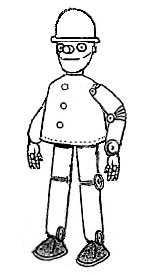 Ages ago (gosh, it was
Ages ago (gosh, it was 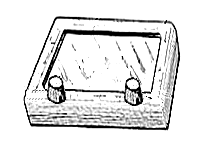 An interesting
An interesting